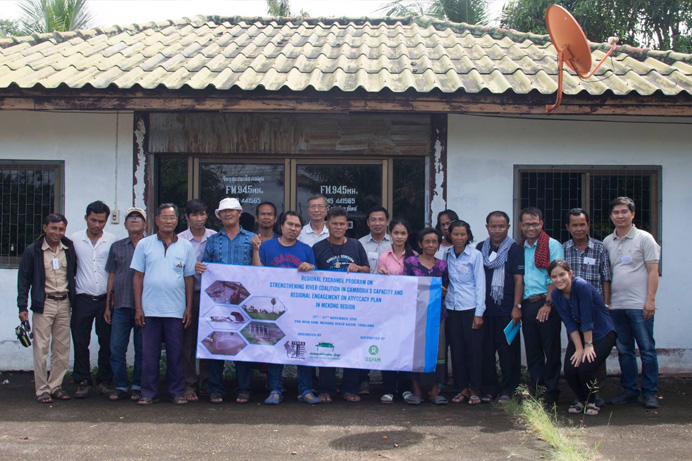
From 21st – 27th November 2016, Pak Mun Dam, Mekong River Basin, Thailand: River Coalitions in Cambodia (RCC) has been facilitated by Community Rights on Hydropower Development project of The NGO Forum on Cambodia. RCC members work closely with dam-affected communities and partners both national and regional levels to advocate, debate and advocacy to influence national and regional environmental policies for sustainable hydropower dams, which are ecologically sound, participatory, gender and climate change responsive for the benefit of the dam-affected communities. The project also works to increases awareness of the impacts of hydropower dams on climate change among dam-affected communities and network members, and encourages the process of public participation in development projects, including an acknowledgement of people’s rights to timely, complete and accurate information on various development initiatives that affect them. There were 10 RCC members were attended in the program. The overall objective of the program focused strengthening cooperation work and increase knowledge and skills of RCC members both men and women through their exchange and inter-learning among dam – affected communities and CSOs organizations in Mekong region. There were three specific objectives:
– Strengthening cooperation and increase knowledge and skills of RCC members and enhance their implementation at the ground and share to other CSOs network members and dam – effected communities and;
– Providing space for sharing, learning and formulating into joint action plan in term of CSOs engagement to work for protecting and promoting community rights in Mekong region.
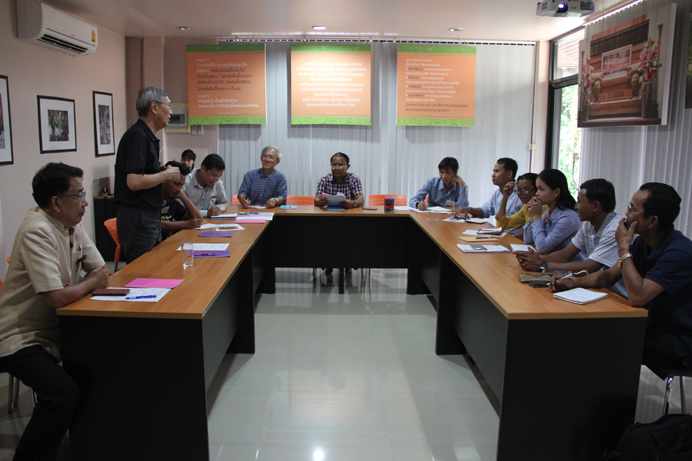 Mr. Srisuwan Kuankachorn, TERRA’s co-director of team leader, warmly welcomed to RCC members. He added that he experienced to organize a similar trip from Lower Sesan 2. He is very appreciated to see dam – affected communities who represented from different places includes Areng valley, Lower Sesan 2, Sambor and Don Sahong cases. He hopes that RCC members and community representatives will be benefited from trip through regional engagement and joint advocacy works.
Mr. Srisuwan Kuankachorn, TERRA’s co-director of team leader, warmly welcomed to RCC members. He added that he experienced to organize a similar trip from Lower Sesan 2. He is very appreciated to see dam – affected communities who represented from different places includes Areng valley, Lower Sesan 2, Sambor and Don Sahong cases. He hopes that RCC members and community representatives will be benefited from trip through regional engagement and joint advocacy works.
Mr. Ek Chamroeun, as representative of RCC’s steering committee, would like say to thanks to Mr. Srisuwan Kuankachorn and TERRA team for supporting to host the regional exchange program. As well known, we have actively worked to advocate on dam issues for better livelihoods of dam – affected communities and sustainable use of biodiversity in Mekong region and its tributaries. We recognized that the effective advocacy should be supported by evidence based research or investigation reports with reliable data. For instance, we conducted a study on impacts of decrease water level in Tonle Sap Lake, Cambodia. Therefore, we do hope that we will learn good experiences from community and CSOs in Pak Mon, Thailand.
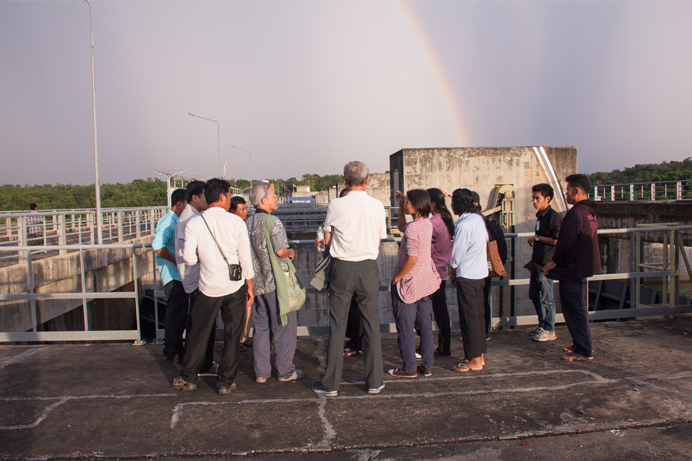 Sharing on struggle of communities of Pak Mun
Sharing on struggle of communities of Pak Mun
A community committee of recovery life of Pak Mun River was established in 2000. The committee members have worked with and for dam – affected communities in 55 villages who lived along Mun River. They divided group of people into 9 regions. Each region has nominated two representative people to be members of the committee. The committee consisted of 18 members. They started to develop community’s strategy plan which cleared direction of their advocacy processes to demand for stop the dam. They started to build networking and established four committees including 1) administrative committee, 2) dam monitoring committee, 3) recovery people livelihoods committee and 4) resettlement committee.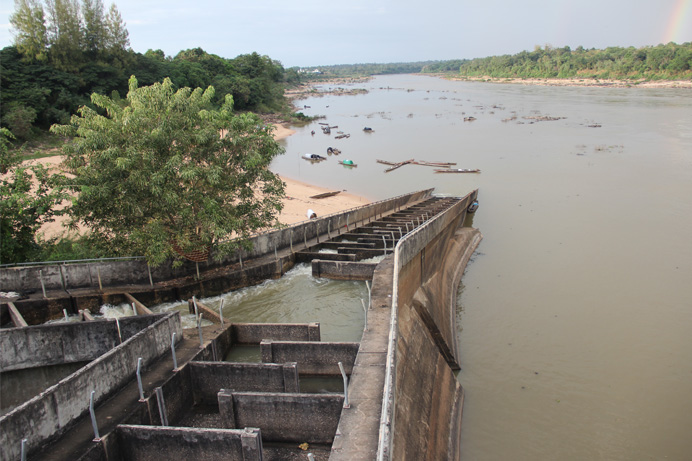
In addition, each village has selected 5 representative people to be members of the community assembly. They have worked to mobilize their community to do campaigns and joint other advocacy activities which were supported by the committee members. The committee’s members work as voluntary with no salary. They have received only transportation costs when they did activity. The funds have been mobilized from its community themselves. Ms. Kam Poy, an eldest women leader, said that “My village started with only two people to do advocate on Pak Mon dam. After that community people have joined more and more”. She emphasized a role of leader should be more active than other people. For example, she went to Bangkok to meet with the Prime Minister which was supported by her own money. She added that “We have no choice, so we must work for our generations”. We do thing right, don’t be afraid it”. However, they faced with many challenges regarding to community organizing and their advocacy campaigns.
To address with challenges, they tried to solve them which assisted by NGOs, academic, law groups and outsiders. They used many approaches to explain their members on what they did through mobilizing people to people, especially through family relation. As experiences, they started with building a good solidary with their community members to make sure that they understood well. And then, they started with other step to mobilize them to join advocacy campaigns.
Key issues / challenges:
– Prior the dam was built, the government revealed most of positive and benefit of dam development. However, NGOs tried to mention negative impacts to livelihoods, fishery and biodiversity along Mun River. So, there were two community’s perspectives on dam. A group demanded for fairs compensation and other group has advocated for stop the dam.
– More than 200 families were resettled to upland areas. There were two options of resettlement plans. If they accepted land, there was no money. They couldn’t do fishing anymore. They started to do farming on low soil fertilizer of lands. So, they faced with many challenges to their livelihoods. It was a reason why most of them sold their lands and migrated to other places.
– Government promised to give social land concession for dam – affected communities but there wasn’t happened due to decision making of Prime Ministry in different mandate.
– Based on a primarily research finding was noticed that there were 265 fish types mitigation in Mun River, but the recent study showed that the number was decreased to 180 species. Therefore, community people are very concerned it will be lost more type of fishes in near future.
– Community leaders been threatened by local authorities regarding to their campaigns and advocacy activities.
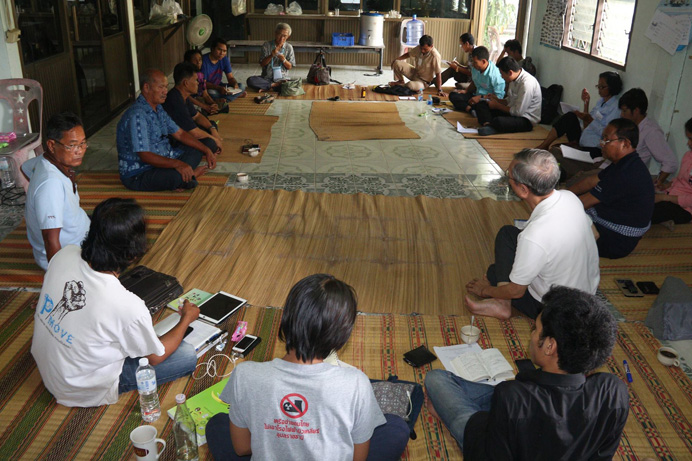
Key Achievements and Lesson learnt:
– Fish ladder was built but it’s impossible for fish migrated on the water flow. A research report showed that there were many types of fishes became gone in 1994.
– Government committed to promote aquaculture sector through provided fish seeds to individual family who was relocated to upland areas. Importantly, resettled communities can be access to clean water and health care center nearest to their villages. Children can be access to their old school which closely distances around 2 to 4 km.
– Indirect impact communities were also received some compensation based on negotiation.
– The government decided to conduct deeply study on negative impacts on fish migration and biodiversity damage in the Mun River. It was a controversial issues and different perspectives on the dam in high ranking dialogue among government’s institutions. As result, the government decided to open water gate of the dam as free Mun river flow for 4 months of each year in a season of fish breeding. Significantly, the mandate of H.E. Aphisit, a former Prime Minister of Thailand, called for conducting a study to evaluate on cost and benefit analysis. The study showed that it wasn’t benefits if we compared costs of income generation and social and biodiversity damaged. Therefore, the government approved to make free flow in Mun River and settled some compensation to dam – affected communities. However, it was not permanently. It was happened only 5 years due to new Prime Minister coming.
– Community leaders of Pak Mun are pro-active to mobilize their community people to do campaigns and other advocacy activities. They encouraged new generations both men and women includes youth to be a leader based on their capacity and knowledge with no discrimination.
Sharing experiences on human rights situation in Pak Mon
Mr. Nikorn Weesapen, human rights lawyer associated with Chao Kham Phong Foundation, presented on civil society cooperation and engagement to promote culture and sustainable use of natural resources with dam – affected communities in Pak Mon dam, Ubonratchatani province. Mr. Nikorn believed that the program will be benefited to RCC members. She informed that he has started to do advocate over 20 years. Talking about Pak Mun case, the advocacy has been transferred from generation to generation. Pak Mun has been noticed as bad experience that people have never expected. In rainy season is flooded and there is no water in dry season caused by the dam. It was very affected to fish migration. To address the issue, government decided to build fish ladder but it’s not a good solution.
Based on his experience, our advocacy should be closed monitor with government and the project proponents. For example, he wrote a letter to Prime Minister in 1993. We must well document all information. When he did a campaign for community movement, he has made clear that community understood and well organizing. Importantly, we should strongly mobilize academic groups and independent researchers to join with community campaigns and advocacy.
Key experiences and lesson learnt:
– Project proponent tried to lobby community in urban areas who needed electricity. They wanted to break down connectivity of rural and urban community. Sometime, government / project proponent tried to make electronic problem includes electronic off as an evidence to show lack of electricity. However, urban community has understood well on what a root cause is, therefore, they still supported dam – affected communities in rural areas.
– We engaged with INGOs and partners to advocate to World Bank who provided financial and technical supports on the project but we did not receive positive response.
– Dam – affected communities have continued their advocacy efforts, especially women while the dam was built.
– Alternative energy is a good resolution includes solar system, biogas…etc.
Sharing experiences on community mobilizing and people movement
Mr. Jamnong Jitnirat, adviser of the People’s Movement for a Just Society (P-Move), shared his experiences on community mobilizing to be stronger, while we started from one or a small family. He gave a case study as below:
It was a case of an elder lady who suffered from a dam development project in Ubonratchatani province, Thailand. She did advocacy over 27 years but she got nothing. And then one day, a guy asked her that why did you do not changed your advocacy strategy? It would be flexible both hard and soft with supported by evidence based advocacy.
She acknowledged an idea. She started to collect and document all data. She tried to approach to all stakeholders as she can including academic groups, Medias agencies…etc. After that most of Medias agencies known her and held to spread-out her case to public audient. A significant of her campaign activity is her key message on TV show program. She said that “Before I died, I want to do farming on my land again”. This key message was shared in social Medias which was received more than 100,000 likes. However, the government did not care what she did.
Therefore, she did consult with her adviser again how to do anymore activities. Through an initiated idea, she tried to digging up the dam as a show to public audient. She did mobilizing their communities to do other campaign activities. As result, government decided to stop the dam.
He advised that “to be a success person, we need to understand well on what we want and how to deal with problems”. It would be making clear what role of NGOs is and how we can do to develop with simple questions to ask communities to thinking about. Significantly, knowledge transfer is very important point to ensure that it will be shared from a person to person. When they understood on the issues and their rights, they will be stronger and don’t afraid anything. Activists should play a vital role to guide poor and vulnerable people to see what their important roles to contribute for society. Activists should be continued to mobilize people in a community and a region as they can. It shouldn’t take seriously only money but we should engage them with our spirit. Asking them how can we help them and try to make them aware on real situations which supported by evidence based information. Importantly, we should ask ourselves that how we can mobilize different groups to listen us.
Key experiences and lesson learnt:
– Community can be changed for better. If we don’t confidant with ourselves, it is nothing happened.
– We would start with simple or easy activity. After that we continue to consider on more strategies.
– It would be clear of our stand and position. How independent you are.
Sharing experiences on community research study
We met with the Nature Care Foundation based in Ubonratchatani province, Thailand. The foundation was established in 1996. A founder of the foundation was a monk who concerned and interested to work for natural resources protection. The foundation has worked with community to do action research focusing on land, forest, water governance and natural resources. They played a vital role to educate community representatives in Pak Mon to do research and documentation. It has been used supported for their campaign and advocacy. However, the research reports were criticized by some government’s institutions and universities. To address the problem, they have engaged with concerning institutions to be involved in part of research processes as provided any comments and feedbacks. Nature Care works to support for funding mobilization from donors and government’s funds. Importantly, they reminded that NGOs or other institutions should not work for them but we should work with them.
Key experiences and lesson learnt:
– Some community people didn’t feeling confident that they can did the research study by themselves. They think that it would be conducted by academic group because they have high level of educations.
– We have some challenges on timing constant due extending more time with them. They have busy for their faming, especially the cultivation season.
Sharing on Human Rights perspectives based on ASEAN and Tran-boundary Mechanisms
Dr. Nirand Pitakwatchara, former senator for Ubonratchatani province and former Thailand National Human Rights Commissioner, shared experiences on human rights frameworks in ASEAN region and UN Human Rights treaty bodies. Presently, trans-boundary issues of human rights violation has been happened widely in the region. It’s mostly affected by large scale development projects includes economic land concessions, mining, hydropower dam…etc. We should use those approaches to deal with the problems. If we aren’t doing some, we have got nothing.
According to UN agency has developed a guiding principle of business and human rights. It would be benefit and supported for monitoring on investment projects to ensure that they will be compiled and respected to human rights and sustainable use of natural resources. However, some violation cases are still happened in the region. So, He encouraged human rights activists and NGOs to work closely monitor on these cases. Based on a structure of United Nations Human Rights Councils, there are 3 parts of human rights institutions. Office of the United Nations High Commissioner for Human Rights is one out of them. It is an important mechanism to help people. He congratulated that the Royal Government of Cambodia has rectified all UN’s human rights. Thailand also has a committee of Human Rights which is monitored by human rights assembly. So, we should use those mechanisms as tools to monitor and intervene on Trans-boundary issues. For example, a case of land conflict in Kog Kong province, Cambodia was affected by large scale development project who invested on sugar cane plantation. It was violated to human and land rights. So, he used those mechanisms to intervene on the case. Currently, the case has been closely monitored by UN agency unit.
Key experiences and lesson learnt:
– We should build and mobilize networks both national and international levels to working with them to demand for their rights, especially Cambodia and Thailand country.
– We should conduct research study to identify ours identify and values which used to compile as evidence based supporting for raising awareness to outsiders.
– We should use both soft and hard advocacy strategies to demand for our rights. We do advocacy supporting by evidence based research with reliable information; it would be very benefit and taking more attractive from relevant stakeholders to help us. E.g. I did a research study with RERRA and disseminated the research results to relevant stakeholders. Based on our reasonable, most of them have very interested and supported us as they can.
– Social Medias are very important to help us for information dissemination.
– We should be more active with political issues because the politics is taking about our rights, development and justice. Therefore, if people well organize, a bad leader might not be possible.